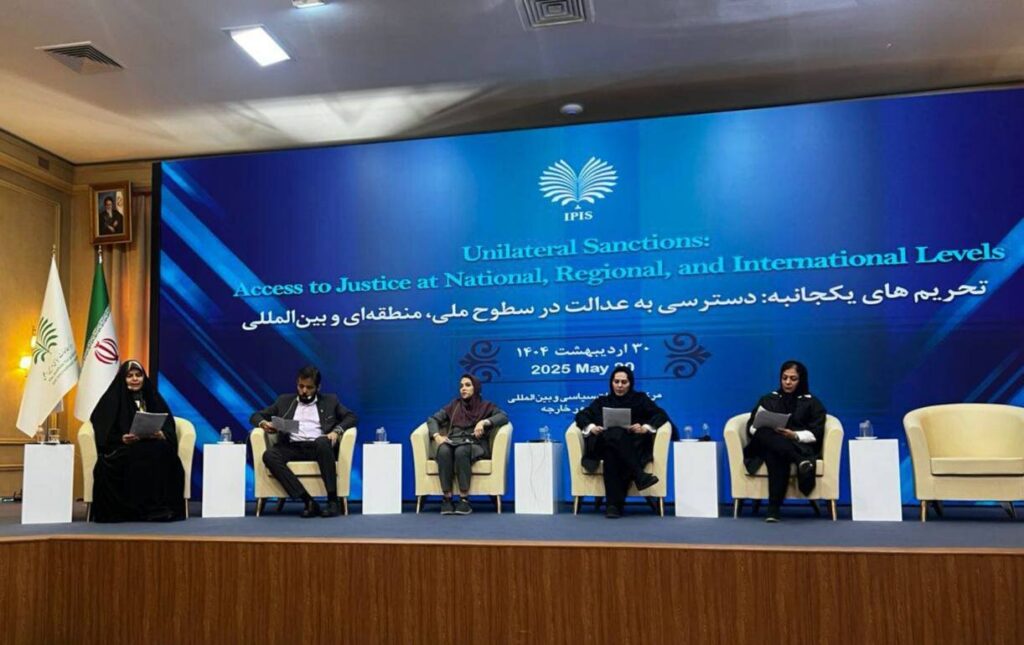The event was held at the Institute of Politics and International Studies (IPI) of Iran’s Ministry of Foreign Affairs in Tehran.
The event was attended by prominent figures such as Iran’s Minister of Law and International Affairs, Qasem Gallibabadi. Arena Duhan, United Nations Special Rapporteur. Atiyah Wallis, an expert on UN foreign debt. along with many other experts and humanitarian rights activists.
One of the important panels at the conference was dedicated to the “negative effects of unilateral sanctions on the enjoyment of human rights.” During this session, various humanitarian law experts engaged in discussions on the widespread consequences of sanctions.
Dr. Monaramani, CEO of the International Institute for Future Development, said at her address:
“Sansions have created a platform for transformation despite the pain and difficulties. Throughout history, Iranian people have revived new paths under pressure, and become part of the solution if infuriating, innovation, and local lifestyles arise within the constraints of constraints.
The CEO of the International Institute for Future Development further emphasized the commitment of social activists to express concerns among Iranian people at the International Forum, adding:
“To overcome the consequences of sanctions rely critically on macro-level national decisions, as well as mechanisms related to fair implementation of international law, strict monitoring of structures, and humanitarian rights. As social activists, we consider it an obligation to be the voice of our beloved people of all global communities and assembly. Choice, equality, and justice engraved in the Charter of Humanitarian Rights.”
Dr. Ramani said, “Economic pressures have weakened family structures, often leading to collapse, especially through the collapse of small and home-based businesses. For example, at least 30% of rural textile workshops have disappeared, causing serious damage to rural communities and vulnerable groups as normal exports have not decreased from urban areas. In an industry deeply rooted in Iranian culture, arts and traditions, there are between $426 million and $41.7 million, with an average household size of four.
She added: “As a result of these economic tensions, marriage ages are delayed and we see the painful consequences of declining birth rates and shrinking the demographic window in Iran.”
Dr. Ramani highlighted the serious human aspects of this situation, which are often overlooked.
“It is important that statistics often not reflect, but they flow through the daily lives of Iranian people. Throughout these years, we have shared tables with millions of migrants and refugees living in Iran. Sanctions and pressures, something remains unauthorized. The heart and dignity of the Iranian people.”
Youth Arab, director of the Thalassemia Association, addressed the impact of sanctions on thalassemia patients. He noted that sanctions directly disrupt many aspects of healthcare for these patients, and mentioned the detrimental effects of sanctions on restricting access to essential health services and treatment options.
Rezai, the head of the Autism Society, also spoke about the export restrictions on essential medicines for autistic patients in European countries. She said such restrictions had a major impact on the social lives of autistic patients and their families.
Ahavan, a university professor and board member of the Thalassemia Association, discussed the challenges facing Iranian thalassemia patients. She highlighted key issues stemming from sanctions, including limited access to essential medicines and medical devices, and highlighted the serious negative impacts on the quality of life and treatment processes of these patients. She also highlighted the need for greater support and removal of existing barriers affecting thalassemia patients.
The meeting on the day also gave speeches from other prominent individuals, including Deputy Foreign Ministers of Legal and International Affairs. The UN Human Rights Council’s special rapporteur has stated that the negative impact of unilateral enforcement measures on human rights. UN independent expert on foreign debt and human rights. Representative of a group of friends who follow the UN Charter. President’s office’s attorney. and several well-known international legal scholars and representatives of NGOs from both national and international organizations. Participants highlighted the urgent need for access to justice to investigate mechanisms that will curb the effects and increased outcomes of unilateral sanctions and hold authorized entities accountable.
MNA

